The most important part of launching a niche site is keyword research. If you don’t do it properly, your site will inevitably fail.
Many niche site projects fail because of some simple keyword research mistakes.
It is a FACT!
However, if you follow this keyword research guide step by step, your chances of success with Amazon niche site will be high. I made thousands of bucks per month following this exact blueprint.
But first…
[toc]
What Is Keyword Research?
Keyword research is the end-all and be-all of people who make money online.
For you to really understand what keyword research is and how important it is to your business and success online, you need first to understand what a keyword is.
According to Techopedia, we can define keyword as:
A keyword, in the context of search engine optimization, is a particular word or phrase that describes the contents of a Web page. Keywords are intended to act as shortcuts that sum up an entire page. Keywords form part of a Web page’s metadata and help search engines match a page to with an appropriate search query.
In short, keywords are often the same as the search terms people enter into search engines, such as Google, to find individual pages or results that match their query.
It’s not difficult to understand how important keyword research is.
It will either make or break your niche site project.

For niche site builders, Keyword Research Is 80%, and rest of the process is 20% of the job.
So, the big question arrives.
What is Keyword Research?
Keyword research is the process of finding the right keyword, with the right visitor intent – so that people who are looking to buy products in the niche of your choice will be led to your website from search engine.
Traffic generated from the search engine is called organic traffic. This is the highest converting and most valuable traffic you will find online.
Why Keyword Research Is Important?
Your keyword research will determine the profitability of the keyword.
Whenever you are working on a niche website, you must rank on the first page for high-quality traffic.
One important point you have to note is that 5 first page visitors are much better than the 10 visitors from search engine’s second page.
You might get a lot of page views targeting huge search volume keywords (and might get a lot of page views from page 3/4 or 10)
This traffic won’t add much value to your niche site profitability.
Page views don’t pay you; it’s the quality users who pay. And you need first-page ranking to get quality audiences on your site.
Visitors, who click on results from 3rd and 4th page of Search Engine, are generally unsure about the product and need more information about it before actually buying.
But people who already have done research on the product, and just need final checking, they won’t go to page 2 or deeper in Google result page. They will check the website from the first page, and will take action from there.
This is the reason you need to rank on the first page. 90% people click and believe on first page results only!
Most people will pay you only if you rank on the first page!
Take a look at it from another perspective.
Let’s say you own a grocery store.
Most grocery stores have a business model set up so perfectly that people blindly give them money. We walk into their store, ready to open our wallets, and spend whatever kind of money is necessary to get the products that are on their shelves.
You will never see a salesman begging you to buy something in a grocery store.
You may see a sample stand, but you are in no way obligated or pressured into buying a product. The people who walk to the grocery store are primed and prepared to walk out of that store with products that they have genuinely spent money on.
Consider your high ranking, converting Amazon niche website that rates on the first page of Google as the equivalent of a grocery store.
When someone needs to buy a Vacuum Cleaner, they will search this on Google. Chances are they will find a high-quality niche site where all the information a potential buyer requires available.
The customer is online, where all the information required is available, and they can just add the vacuum cleaner on the cart.
No push selling is really involved in this process.
Think of this for a second, as an owner of the website:
How would you like to have 150 people per day visit your website, ready to buy a vacuum and pay you money as commission while they purchase their product?
Can you begin to see the potential of finding the right Golden Keyword?
Do I have your attention yet?
What Makes a Keyword a Golden Keyword?
As you do your research on keywords, one of the things you’ll come across is a golden keyword.

Note: I wanted to design a meme with the text. But ended up putting the text in one of my recent photos! I talked about Passive Income & Amazon Affiliate Marketing at Payoneer Forum Dhaka event last month, and the photo was snapped during the session.
Golden keywords are the most valuable keywords online. These are the ones that will convert well and make you money.
Golden keywords have four key features.
Search Intent, Search Volume, Low Competition, and Commerciality.
In other words, golden keywords are those that have the ability to command traffic to your website (enough search volume), have acceptable level of competition that show the keyword is in demand (and easy to rank), and one that has a high degree of commerciality, or people spend money on that keyword.
The search volume is something you can find with Google’s Keyword Planner.
For competition analysis, you can do it checking competitors manually, or you can also use competitor analysis software like Long Tail Pro.
Search Intent
Golden keywords also carry other attributes. You need to look at the level of need for a keyword. The search volume is not as important as it used to be. Instead, intent carries much more weight.
Keywords that have a lower search volume, but solve a bigger problem are much more profitable than keywords that have a high search volume but don’t solve a problem.
Searches for “funny weight loss pictures” may be in the tens of thousands while searches for “weight loss products” may not be nearly as high. However, the conundrum comes when people are willing to spend much more money on “weight loss products” than they are on “funny weight loss pictures.”
Ready To Purchase Term
Buyer keywords are also something that you may need to look at.
Buyer keywords are words like “best” or “discount” or “reviews.” When people are ready to purchase a product, they often perform a keyword search with the product name in the search followed by one of these buyer keywords.
When it comes to Amazon niche site keyword research, the following terms are considered as ready to purchase term.
- Best/Top Rated + Product Type
- Cheap + Product Type
- Quality + Product Type
- Product Name + For Sale
- Bargain + Product Type
- Best + Product Type + Online
- Best + Product Type + Review
- Best + Product Type + Year
- Buy + Product Type / Product Name
- Where Can I Buy + Product Name / Product Type
- Product Name + Vs/Or/Compared to + Product Name
- Product Name + Review/Reviews
- Product Name + Coupon
Cost-Per-Click
Cost-Per-Click is a crucial part of the formula because it tells you how valuable a keyword is, how much an advertiser pays for per click on the keyword.
You may not be running a Google AdSense campaign, but you will need to look at keywords that are valuable.
If people are paying lots of money to pay for clicks for the keyword you’re considering, then you know that your keyword is valuable – bringing you lucrative, moneymaking traffic.
Sustainability/Trends
The final part of what can make a keyword golden is the sustainability.
On the Google Keyword Planner tool, if you search for keywords such as, “Christmas gifts” or “Valentine,” you would find that these keywords are not sustainable throughout a 12-month period.
They have very high peaks around particular times of the year.
You can use the Keyword Planner tool in order to discover if your keyword is sustainable and has a large number of searches throughout the entire year. I checked the trend for best axe in Google Keyword Planner.
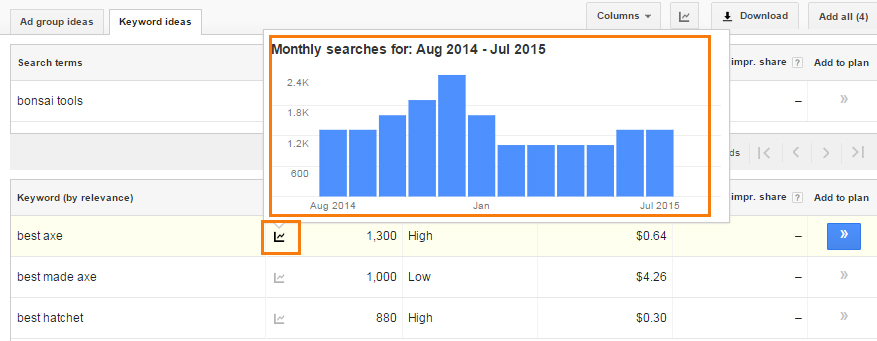
You can also check this data from Google Trends.
If you don’t check the trends before finalizing a keyword, you may find yourself with a surge in visitors once or twice a year with the rest of the year mulling on without a sale.
How to Find Profitable Keywords For Niche Site?
How do you find these golden keywords for your Amazon niche site considering all these factors?
How do you finalize keywords that are so incredibly targeted to your niche site that people will search for, find your site and click on it, and give you a sale?
Before going into the details, let’s have a look at the steps of finding niche site keywords.
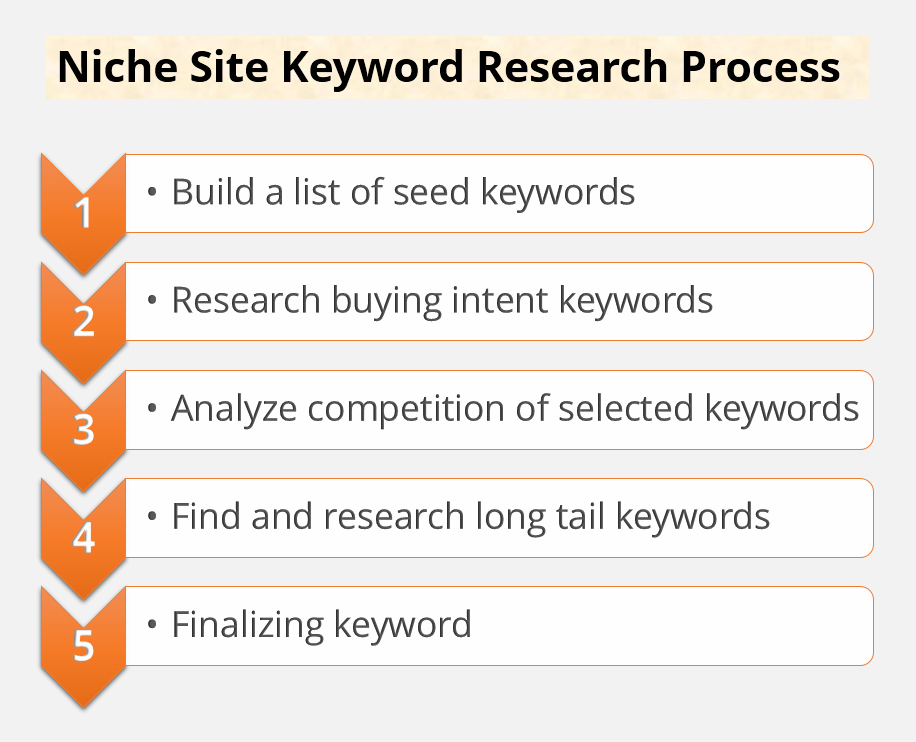
Now we will go into the nuts and bits of the keyword research process one by one.
How To Find Seed Keywords
[sociallocker id=”709″]
Seed keywords are the words you need to start a keyword research project. These are the base words people search to find particular search results.
You can’t target seed keywords to be used on your site, but these keywords will help you finding in-depth/ long tail profitable keywords of your industry.
Suppose I’m researching keywords for an Amazon niche site about home and garden tools. ‘Gardening Tools’ might be a promising primary seed keyword. It will lead you to discover the complete list of home and garden tools like, ‘Axes’, ‘Bonsai Tools’, ‘Bulb Planters’, ‘Cultivators & Tillers’, ‘Manual Weeders’ and so on. We can easily find out deeper seed keywords using Google, or checking Amazon subcategories.
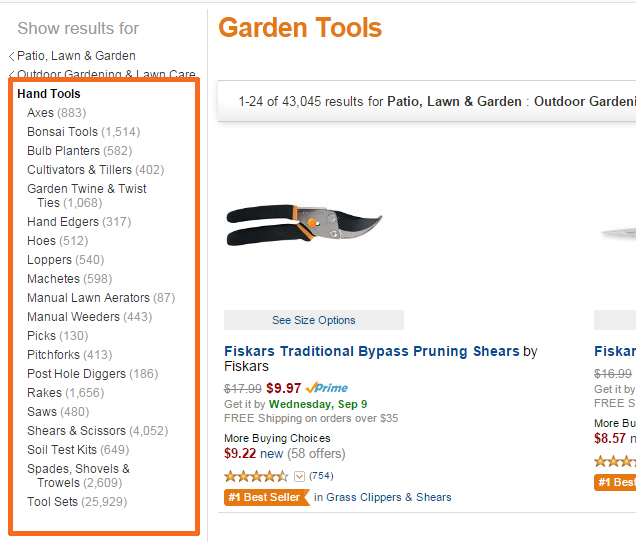
And using these seed keywords, you can find dozens of ‘buying intent’ keywords for your niche site.
The greater number of promising seed keywords you have on your list, the probability of finding most profitable keywords will be higher.
Let’s go into the details of getting seed keywords.
The best way to find seed keyword is to browse Amazon category directories.
When you go to the Amazon website, have a look in the upper left-hand corner. Directly under the Amazon logo, you will find the words, “Shop by Department.”
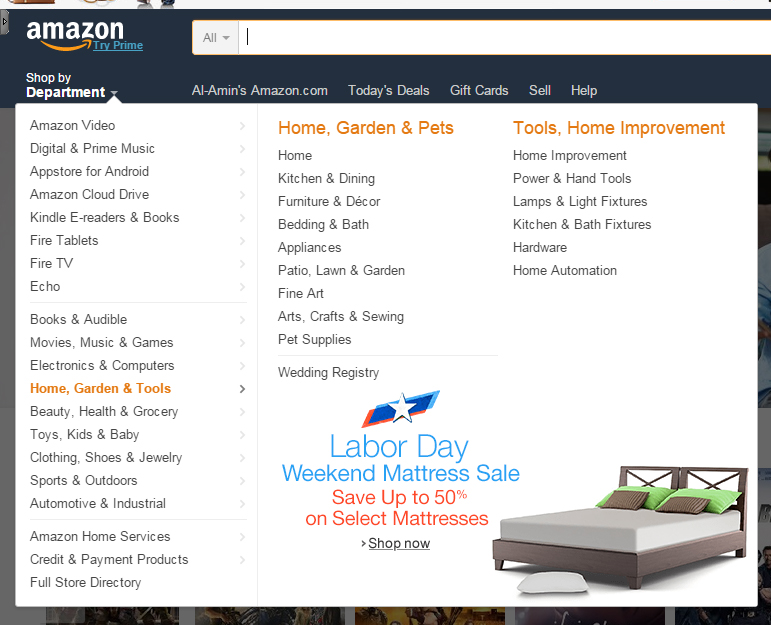
If you hover your mouse over it without clicking on anything, it will bring down a drop-down menu of the most popular categories found on the website.
However, this drop-down list uses a very limited view of some categories that are found on Amazon. You can click on Full Store Directory and you will be landed in a page full of product categories and sub categories. For a niche site builder, this is the best source for building seed keyword list.
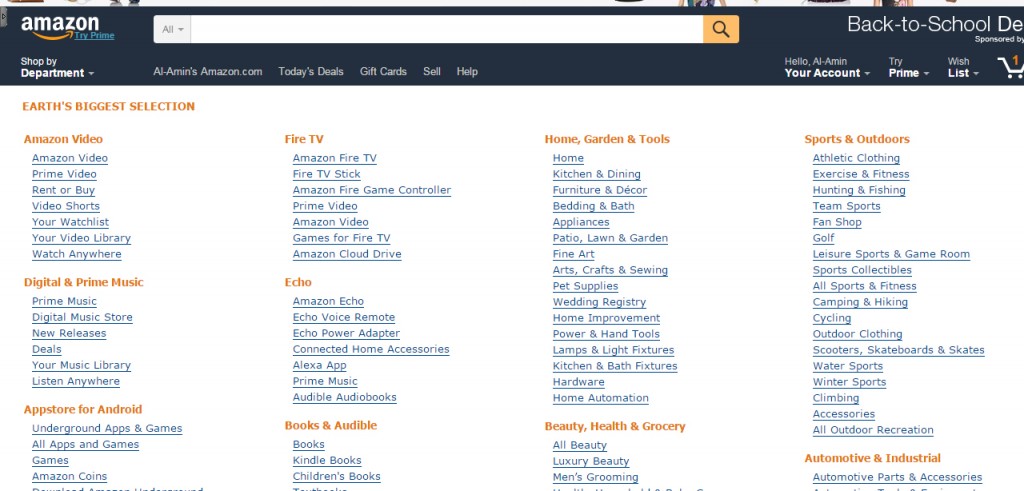
This brings up a page that offers every single category and subcategory found on the page. This is where you find your niche/ seed keyword idea and exactly where the products are related to your niche fall under.
You can find out which products in your niche sell well, as well as the ones that do poorly. Amazon doesn’t provide any sales figure or data for any product. However, you can assume which products are hot selling by its’ number of reviews.
I don’t work in any niche which has average reviews of below 10. So, I wouldn’t advise you to work with such niche either.
On this step, your task is to build a list of seed keywords into an excel file.
[/sociallocker]
Researching Keywords Using The Seed List
Now we need to use the seed keyword list to find ‘buying intent’ keywords.
The tool that comes handy for this purpose is the Google Keyword Planner. This is a free keyword planning tool that Google offers to Adwords advertisers. You don’t have to be an advertiser to use the Google Keyword Planner, though.
You can sign in into the program using your existing Gmail account.
Click on Tools – > Keyword Planner once you are logged in.
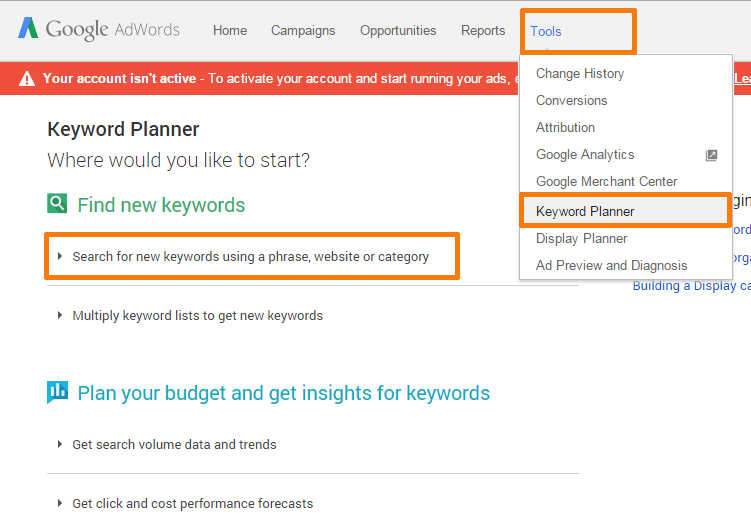
Now click on ‘Search for new keywords using a phrase, website or category’ and you will be prompted with the following screen.
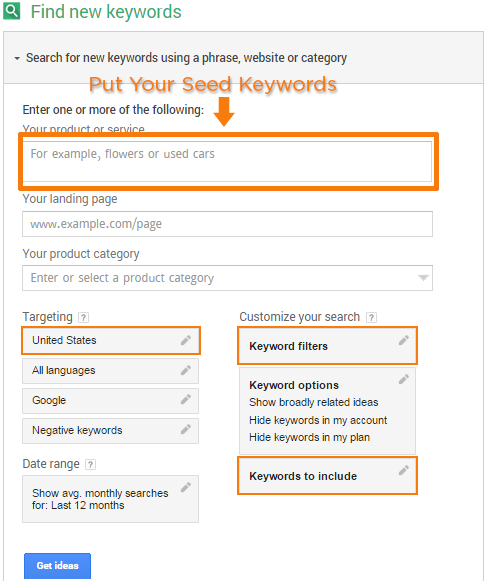
Check if your targeting country is set to the United States, if not, select it.
Now you need to filter your keywords search volume. For me, I always select from 800 to 5000 for the main keyword of the niche site.
You can set this filter from the following option.
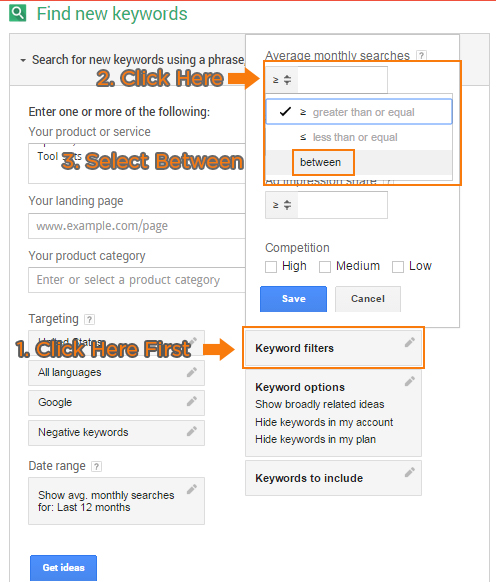
Now it’s time to think about ‘Buying Intent’ filter.
I mentioned a list of patterns for keywords which we call ‘Buying Intent’ keywords. For Amazon niche site, I only prefer to work with ‘Best + Product Type’ keywords.
So you need to add a filter here so that Google keyword tool only shows the keyword containing the pattern. You can do it following these steps:
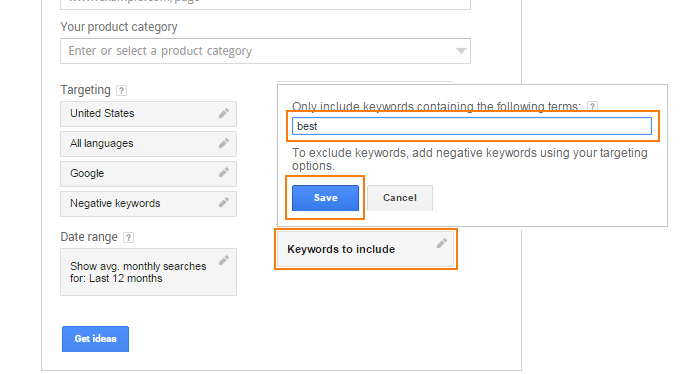
I added ‘best’ to include, you can also add ‘Top Rated,’ ‘Cheap’ or other buying intent words here.
Now clicking ‘Get Ideas’ will result in you finding dozens of keyword ideas, following all the filter set.
You now need to add keywords to your list that fulfill the following criteria.
- Monthly search volume is between 800 to 5000
- Keyword pattern – ‘Best + Product Type’ [This is most important, I never work on any keyword without this pattern] Note: We already have set filters for these two criteria, so Google won’t show any keyword that doesn’t meet this set of characteristics.
- Evergreen search (Read Suitability paragraph again if you don’t understand)
- Any specific product type, not broader niche like ‘Best Fitness Equipment’. A perfect example of specific product type will be ‘best spin bike.’
- Products available on Amazon
- Price ranges from 50 to 500
By now, you possess a list of researched keyword on your list for competition analysis.
How to do that?
Let’s go deeper.
How to Analyze Keyword Competition with Long Tail Pro
Long Tail Pro is one of the most used and popular keyword research tools. It is an all-in-one keyword research tool that is crucial and critical to your keyword campaign.
I reviewed the newest version of Long Tail Pro on my site beforehand. You can purchase the software, or download a 10 days free trial now to continue with keyword research.
Long Tail Pro allows you to find less competitive keywords in highly competitive niches which make it that much easier for your site to rank really well.
Let’s go ahead and open the Long Tail Pro software (download 10-day trial now!) and go to the upper right-hand corner, click on settings and connect your Google account and your Moz account.
As you do that, go ahead and adjust the settings to your liking.
When you’re done, you can go ahead and create projects.
Your project will be your keyword research. Click on the “+” in the upper left-hand corner. A dialog box will come up where you can input your target country, your language, and your search network.
On this step, give your project a name, and leave everything default.
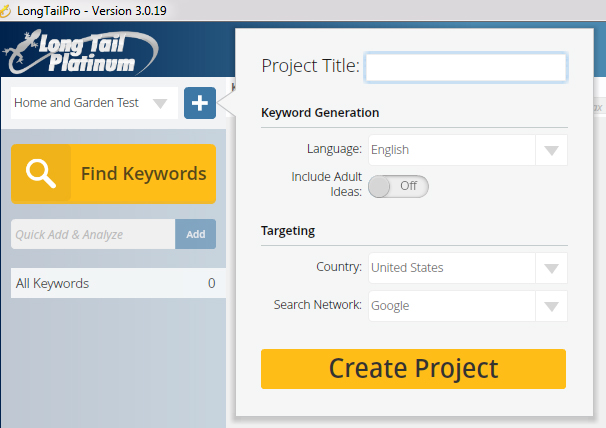
We will only select the US because the country is the number one target for Amazon Affiliate marketers.
A fact: Amazon generates double revenue only in the US, compared to the rest of the world!
Begin the process of searching for your keyword by clicking on Find Keywords. You will be prompted with the following screen.
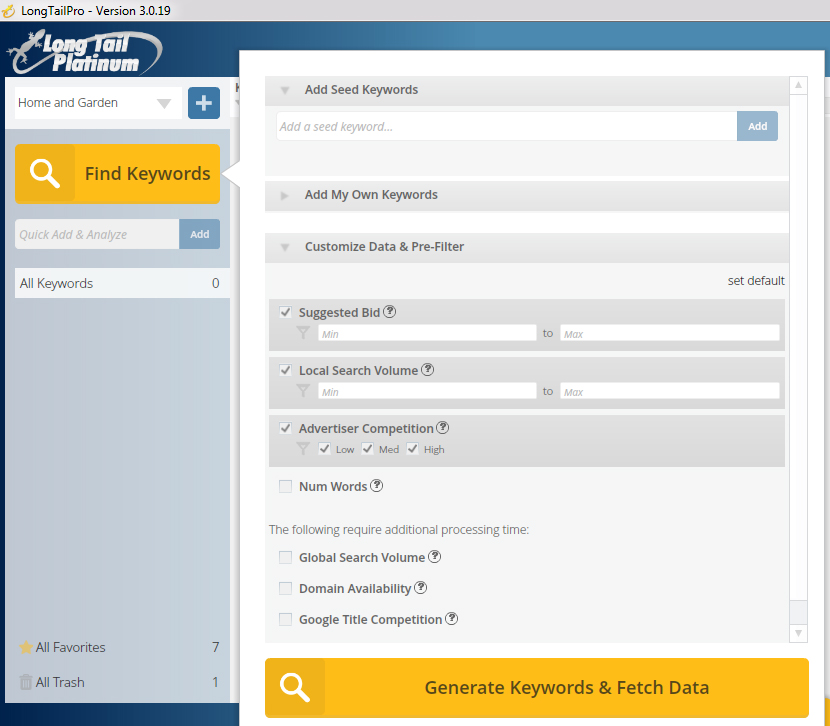
You can do keyword research using your existing seed keywords (I don’t use this option much, as the latest version of Long Tail Pro is slow as hell! I prefer Google Adwords keyword planner tool for this task)
Also, you can analyze the competition of keywords you have already found following our previous method (using Google Keyword Planner).
Click on the ‘Add my own keywords’ tab and put your seed keywords there.
Now leave everything default as we don’t want to customize anything. Click on ‘Generate Keywords & Fetch Data’ and you will get your keywords with competition analysis data details.

To find lower competitive keywords, look under the keyword competitiveness column. Click on ‘Calculate’ and you will be shown the competition level of that particular keyword.
Your first goal in this step is to find out the keywords that have KC 30 or below; less than 25 is even better.
Anything above that will make it tougher to rank in the search engine. The idea behind this data is to show you how tough it would be to get organic traffic for your given keyword.
The higher the number is, the tougher it will be.
Check the image below to get an idea about the organic competition based on KC metrics.
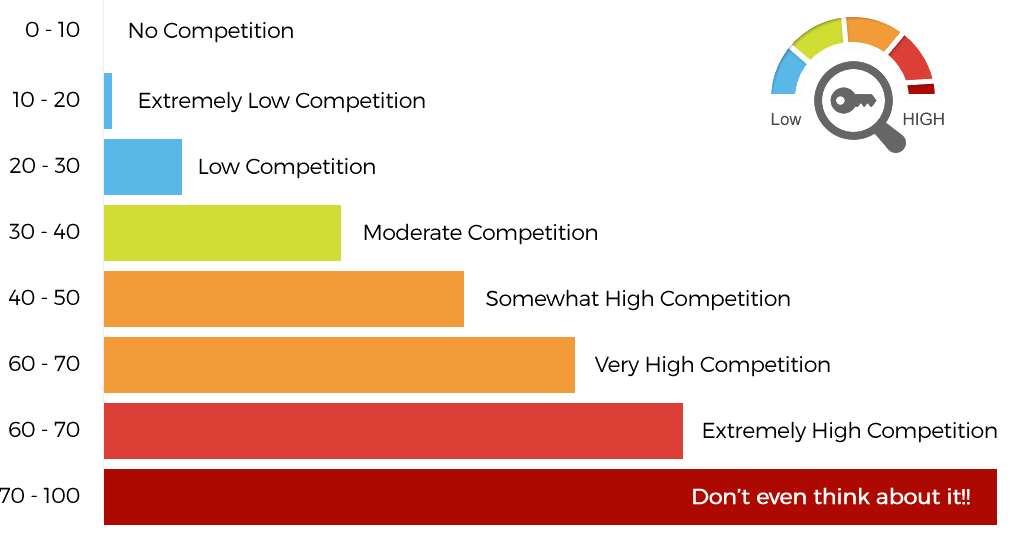
You have found some keywords that have KC under 30, right?
How To Determine Which Is Low Competitive Keyword?
Keyword Competition Analysis with ease, this is where Long Tail Pro shines.
If you click on a keyword, it will bring up the top ten search results from Google with metrics for each result.
You will see results such as page authority, website name, page links, juice pages, page authority, domain authority, site age, page rank and other metrics you need to determine whether you should go for it or not.
Sometimes, you will find a keyword that resonates with you. Long Tail Pro will allow you to mark the keyword as a favorite so you can come back to it later.
Compare different keywords with both the competitiveness and other metrics to find one with a relatively low competitiveness. This is the process of finding keywords which you will use to rank well for that your competitors are failing to use.
After building a list of under 30 KC keywords, we need to check the competitiveness manually once again to see if you should finally go for it. An example of Long Tail Pro competition analysis data.
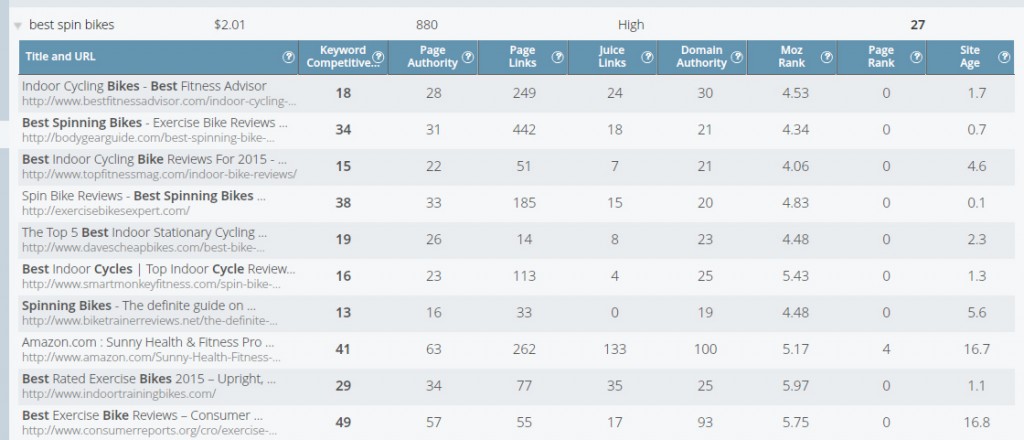
Here is the metrics I personally follow:
- Competitor Keyword Target: Do most of the sites use the exact keyword in the Title of their page? If yes, this is a negative factor for you.
- Root Domain: Lots of root domains on the first page are bad. I usually avoid keywords which already have 4 root domains on top ten. This shows a big group of marketers is already working on the niche, meaning you will have a tough time beating them!
- Weak Site: I LOVE to see multiple “weak” types of sites ranking: forums, yahoo answers, ezinearticles.com and other article directories, or other user generated contents like Pinterest board. If you see any of these weak sites ranking on the first page, this is a plus point for you.
- Page Rank: Low PageRank is always preferred. I ensure that on the first page, results have at least 3 pages with 0-page rank.
- Juice Page: Multiple sites with Low Juice Page Links (at least 3 results having below 10 juice pages). Whenever I see some results that have huge juice pages (over 300-400), I try to avoid this keyword.
- Page Authority: Low Page Authority is always great to see (at least 2 pages below 30-page authority in top 10)
- E-Commerce Sites: If top 10 results have lots of eCommerce stores listed (Amazon, walmart.com, BestBuy, etc.), I usually skip – Google tends to rank eCommerce sites better for eCommerce related terms.
- Info Sites: I like to see information type sites (eHow, Squidoo, etc.) for information based keywords. Or lots of Adsense based sites also tells me I might have the potential to rank (if other criteria above is met).
Congratulations! You should have some keywords after completing these steps.
Now What?
Starting the niche site already?
No, wait…
We need to research long tail keywords to finalize the keyword!
How To Research Long Tail Keywords
You just got the main keyword for the niche site. But we need around 40 more keywords to publish content on our site and make it content rich. Google loves content rich sites.
As discussed in my previous article, I publish 3 types of contents on a niche site.
Review Contents, Product List Long Tail Keyword Contents, and Resources Contents.
You need to research keywords for these contents now.
Review content keywords are basically the terms people use to find product reviews on Google.
If you want to search for ‘Macbook Pro’ review which keyword will you use? You will just add the word ‘review’ at the end, right?
As we want to target people who are in buying mode already, Product Name + Review pattern will be the best keyword to target.
You can quickly build the list of products available on Amazon on your selected niche, and use them in Google Keyword Planner tool as Seed keyword. Just like we added ‘best’ as to include in Keyword before, you can add ‘Review’ to filter review keywords.
We need around 20 review keywords for a niche site.
The next keyword set is ‘Product List Long Tail Keywords’, I found KeywordTool.io is the best tool to find these keywords. Put your primary keyword (and some variation) on the box and it will generate hundreds of long tail keywords.
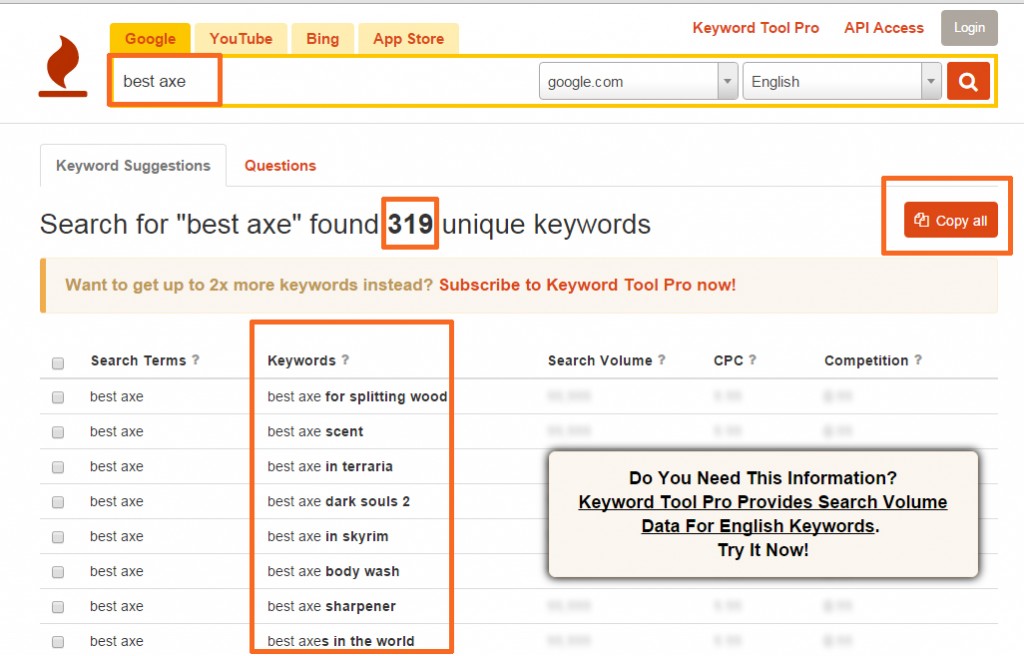
If you are using KeywordTool.io free version, you can copy these keywords and paste into Google Keyword Planner tool to see the search volume.
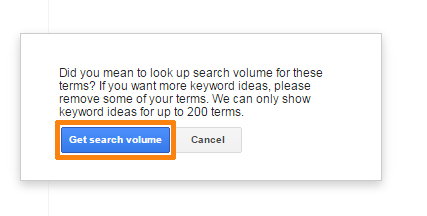
Add keywords to your list that have at least 50 search volume per month.
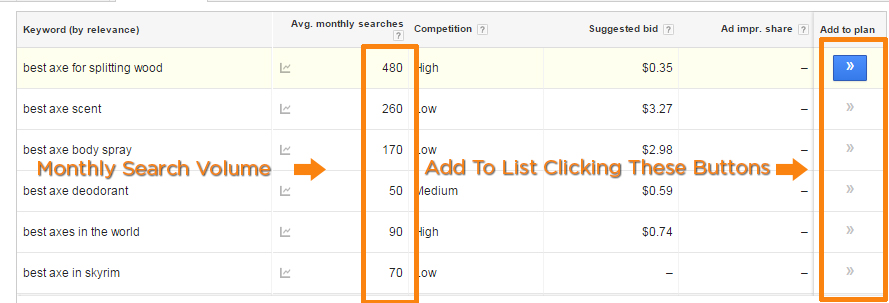
The more the search volume, the better.
The last type of keyword is ‘resource/how to keyword’. You can easily generate these keywords using the tool mentioned above.
Put your primary keyword in the box, click the search icon.
You will be shown two tab ‘Keyword Suggestions’ and ‘Questions’. Selecting Questions will results you dozens of how to keywords. You can follow the similar process shown above to find the search volume of the keywords and select the final keywords to work.
I look for keywords that have 50+ search volume.
I publish at least 2 to 3 resource keyword contents for every niche sites.
The more, the better.
Long Tail Keywords Using SEMRush
You can also use SEMRush to find vertical keywords analyzing your competitors.
This tool is absolutely essential too if you want complete the keyword research process efficiently. It will figure out which keywords your competitors are using so that you can reverse engineer them.
For many people, this tool is an absolute must in the SEO toolbox.
You can put your competitor’s URL on the Dashboard, and it will show the keywords your competitor is getting traffic for.
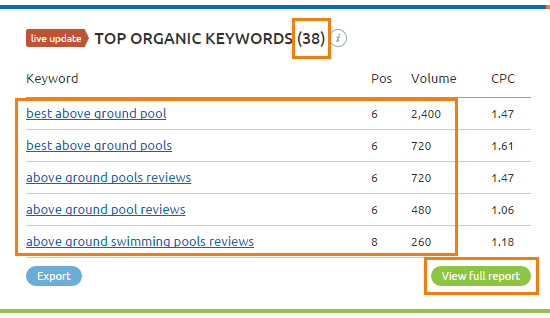
How to Finalize a Keyword for Niche Website
Keyword research is not clear-cut.
It is not easy.
If it were easy, there wouldn’t be any need for a guide such as this monster one!
So the question remains, how do you finalize a keyword for niche website?
The best answer I can give you is to reduce as much risk as possible. Make sure you double check everything.
Mandatory Metrics You Shouldn’t Avoid
- Domain Authority – Make sure at least 2 domains under DA 30
- Juice Pages – You shouldn’t avoid juice page parameters while finalizing a keyword
- Site Age – Make sure at least 1 domain that has age under 1 year on the top 10.
Checking On-Page
Don’t forget to double check your competitors on page SEO details.
- Content Length: The longer the content length of your competitors, the tougher it gets for you to outrank them. As long content tends to rank better in SERP.
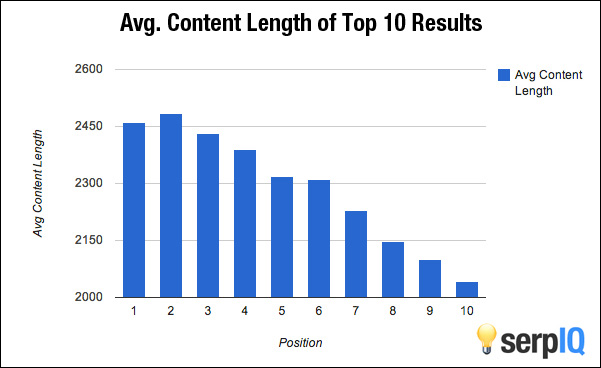
Source: serpIQ
- Content Format and User Experience: Check content format and User experience issues matter in ranking. It doubles your reader. If your competitors’ content is well formatted and published with beautiful, user-friendly design, then it will be harder for you to outrank them.
- Social Share: Social signal impacts search engine rankings. The more social share they have, the less easy is to outrank them.
- Multimedia Files: Adding multimedia files (Images, Audio, Video) to site is one of the important On-Page SEO Factors. It helps website rank better. If your competitors have multimedia file on the site, you will have to work more to outrank them.
- Targeted Keywords: Did your competitors targeted the same keyword you are targeting? If they are not targeted result, you can easily outrank them.
- Internal Linking Structure: Internal links helps passing juice and weight to other pages. Strong internally linked sites are always ranked better.
Analyse Competition With First 50 Page Result
Analyzing the first 50 result will help you understand the ‘upcoming threats’ for the keyword.
If you see there are a lot of new niche sites in the top 50 who are struggling to get on the first page, you should avoid the keyword. It means you are going to face a lot of competition soon.
But if you see there are a lot of weak sites or low-quality sites in the second and third page, means you can easily outrank them. There is high competition for the keyword.
Limitation With Keyword Competition Score and LTP
I should warn you.
The keyword research and competition analysis steps mentioned above have some limitation.
You should have already known, some marketers are building a bank with Private Blog Network (PBN). Using PBN links to a niche site is one of the quickest methods to make some bucks.
As the marketers own the PBN sites, they can easily block access to link research tool bots, so OpenSiteExplorer, Ahrefs, Majectics or any other tool can’t see them!
What does this mean?
Your competitors have powerful PBN backlinks, but your link research tool is showing they are ranked on the top of Google with 0 or a few links. So you assume you will also be ranked in the same place if you follow your competitors and build some essential links!
There are a lot of people who struggle to rank their site on the first page with the keyword that has KC under 25 for the same reason.
So how to beat this limitation?
Check with multiple tools, do some manual research and finally select your keyword with a thorough review process.
I also need to warn you about some limitations of Moz.
Analyze Backlinks With Some Other Tools
Moz is not Google. They are just a third party company providing some competitor analysis data.
Moz has some limitations. In fact, it’s easy to manipulate the Moz metrics.
Moz doesn’t have entire visible web indexed on its system, it is not even near to Google. So, when it comes to taking the final decision, you can’t completely depend on Moz.
I know you are being frustrated now. But this is just the reality.
What’s the alternative?
Well, every backlink analysis tool suffers from the same problem, poor indexing of backlinks. No tool can provide you 100% or any near number of the backlink profile. At the best, you might find 1/10th of the entire link profile using Ahrefs (the best tool when you are analyzing backlinks)
You will never find other 90% links with any single tool. What you can do is to use multiple tools (Moz, Ahrefs, Majestic, Raven Tools, SEO Spyglass, WebMeUp) and combine the report into one.
If you see there is a big difference between Moz and other tools with combined data (way more backlinks to competitor sites than Moz is showing), you should definitely avoid the keyword.
If you see there is no big difference, your niche site keyword is a GO!
Your Turn
This step by step guide is what has been working for me ever since I started running niche sites, and as I said before, there is nothing more important than a perfect keyword research.
If you follow the steps, you will be able to do profitable keyword research for your next Amazon niche site.
Print this guide. Keep it handy. Put it where you can find it quickly – preferably within arm’s reach.
As you get started, you will be referring to it a lot. However, as time passes, you’ll find that you’ll need it less and less. Pass on the information forward so that others can also benefit from these tricks
If you have any questions, you’re most welcome to inform me. I would love to answer.


This is a monster keyword research guideline, Al-Amin!
Perhaps the best content at Marketever. Thanks a lot for spending hours of times writing this amazing piece of content for us 🙂
Thanks, Chris. I’m glad that you loved the guide.
@Chris On … yes it is possible by only Al amin kabir .. Real hero of Internet marketing.
Amazing !! A to Z about keywords research .Nobody need to find any resource anywhere anymore…
Thanks for the comment, Tareq!
Thanks for your Great article. waiting for next post…
Thanks for the heads up, Rubel. I’m now writing a new post on how to find proven keywords, which are making people money and the way to replica the success!
I have been learning keyword research for last few months. I have seen hundreds of youtube videos, read dozens of articles and gone through some forums to understand every single bit of it. And now I wish to believe my journey of “learning keyword research” ends up here whit your amazing article, Al-Amin Vai.
So, it’s time to jump on to work now.
best regards….
Thanks for the heads up, Ziaul Haque! Feel free to let me know if you have any further query. I would love to answer and add them on this content. 🙂
Woo, one of the best post I ever saw dude! Hats off!
Thanks, Shourov!
Excellent Article. In Depth step by step KW Research process. It does cover both Research and competitor analysis which is very Helpful. Thank You for such a wonderful article.
I’m glad that you loved the content, Shakhawat!
I badly wanted this type of details information regarding Key Word Research. Its too handy 😀 Thanks for sharing bro. You’re awesome.
I’m glad that you loved the guide, Rony!
Oops can’t thank you for the article because nothing new to me 🙁 Waste of my valuable time and bandwidth!
Thanks for the feedback Sam. I wish I could give your valuable bandwidth back!
Very informative articles that reveals the full details of keyword research. Thanks for your great article.
Thanks for the heads up, Monir!
Nice post. I am regular reader of Marketever. Thanks for your effort to provide this informative article.
Thanks, keep reading.. You can also let me know if you have any suggested topic that you want me to write. I will try my best 🙂
Excellent informative and helpful article, you are awesome bro,
Thanks for share.
I’m glad that the article helped you, Zebon!
Thanks for the reference to our blog. I appreciate the link and glad you found it useful!
You deserve the link, Eric! Thanks for the comment.
Nice post! I even picked up a few tips myself and I’ve been making niche sites for years, so thanks for that 🙂
Also, I think you might be the person who shared my site in a Facebook group last week? If so, thanks for that as well 🙂
Hi Shawna, Yes… I’m the person shared your link to my group last week and sent you a message.
I read your posts, subscribed to your list. Hope to learn a lot from you too! 🙂
Hrm, I didn’t get a message…guess I need to check that contact form plugin and see why that happened. If you want to send me an email, you can use the one I used for this comment.
Ops. I used the contact form. Please check the issue. For next communication, I will use the email option 🙂
This is so cool info…I am printing this right away..
Thanks, Vance!
This article contains rich information. Thanks for your Great article. Waiting for next post!
I’m glad that you loved the post, Rashed! 🙂
Please notify me of new post by email.
Subscribe to email list and I will send you update regularly 🙂
keyword research is one of most important things to do as a marketer here is where most of us messed up for long time,i really had to read twice this post,it is a very informative post,thank you for sharing bro.
I’m glad that you loved it, Lusekelo!
i need to know what is Seed Keywords ???
Click here, and unlock the social locker to find the answer! 🙂
Thanks for your Great article….It will help newbie …
I’m glad that you loved it, Jubayer 🙂
A very wonderful and comprehensive post on keyword research man,
We all know how important it is to building a successful site. Anyone that really want to start a niche site as a business must not ignore keyword research because, that is the only way you will know whether you’re going into a ptofitable niche or not.
Thanks for sharing man.
Exactly, Theodore. Keyword research is the key to building a successful niche site.
Alright, I’m glad that you loved the guide 🙂
A great piece of content. This is the most comprehensive guide for niche site KW research. I appreciate your tremendous effort. Finally, got the whole picture. Hats off! Its time to kick out hesitations and start work. 🙂
Thanks, Shahariar. I’m happy that this guide let you get started with your keyword research process.
Wow! This is a great guideline I ever read on online about keyword research. Surely, This Guideline will help novice marketers to learn how to research keywords perfectly. I am eagerly waiting for your next upcoming post.
Exactly, Firoz. This guide is written keeping novice marketers in mind. I hope this will help intermediary niche site builders too. 🙂
Thanks for your important article.
Thanks for the heads up, Nadim
I had many confusion & question about amazon niche keyword research and niche selection. Now I have very clear understanding about them. Though I will read the whole article again. I loved the way you wrote from A to Z. Thanks for your hard work and spending many hours to make such a great article like this.
I’m glad that this guide makes you understand A to Z of keyword research for Amazon niche site.
I hope you will share this with your friends too!
Really a great post !!! informative and helpful .
Thanks for the complement, Limon
Thanks bro for your valuable post.
You are welcome, Anik!
This article guided me to many tools for keywords research.
Thank you Al Amin bhai 🙂
I’m glad that you loved it, Hasan 🙂
al amin if i dont have long tail pro or samurai marketer then what is the free way to calculate keyword competitiveness
Hi,
Interesting and very detailed keyword research guide, it helped me a lot to do the keyword research.
Hi,
Thanks for your detailed guideline on keyword research. I wanted to be clear about this topic” What is the difference between buyer intent keyword and long tail keyword?”
Thanks
Great post.
So going by your guidelines of competition analysis and the LTP screenshot you posted, “best spin bike” is actually a great low competition keyword? Would you go for that one? Why (not)?
Great post.
I did as you outlined above. I found 5 niche sites in the top 10 serps. All monetized with Amazon. Is this a no go? Or a sign that its easy to rank in this niche?
Thank you
Michael
What will be the first task for a new comer to join in the amazon affiliat market?
Thank you so much for writing this amazingly helpful and detailed post 🙂
I am based in the UK and have an Amazon affiliate account for http://www.amazon.co.uk but for my first niche site would I be better trying to rank in google.com and link to amazon.com?
Thank you
Definitely its a great post and i already started following your suggestions for some other project. hopefully i will read your all other posts as well. Thanks again!
This is very effective guideline for affiliate marketing,so thank you very much.
Thanks for your enriched post on keywords, which is also useful.
Splendid post. I am a beginner. It will be effective for me ten times more practice than by myself.
Wonderful post! Thank you so much. How do you guys measure keyword competitiveness if you don´t have Long Tail Platinum. I use it right now but it is quit expensive when you are still working on your first site that does not earn any money yet.
Great post with extensive detail. Took me a long time to read, but I am now happy I did that.
Hats of for you brother.
wow
this is the best long tail amazon keyword research I have ever seen
Really this site is very good helping hand to develop career thanks.
alamin vaia it was an awesome post that i have read ever.actually i was searching this type of guide.you are great.
i have questions that
-according to this guide to do keyword research for practically a niche site how many days should i take
Indeed a great post about Keyword Research.
There is no doubt that Keyword Research is the most important part of building a successful website. Without targeting the right keywords, We can never drive traffic and sales.
Keyword research is important as much as making a PLAN before doing something really great. 😀
When I started my blogging carrer, I never knew what keyword research is, I always cover articles on random keywords and that was the reason, I wasn’t getting traffic and sales because I was running in the wrong direction.
But When I learned about keyword research then I found my mistake and started working on it.
In this guide, You have covered keyword research in a very detailed way and It is very much helpful to so many readers including me.
So Thanks for sharing such a wonderful article with us. 😀
Thank you Al-Amin. This is a great and cool guide to keyword research. Now i understand very well. Alhamdulillah. I hope I can stand on your level one day. I subsribe your mail and will learn many things in this awesome blog.
Hi Almin,
Let’s say I target keywords: a4paper. But a4paper.com is already taken. So if I buy besta4paper.com, instead of using a4paper.com, will it affect my SEO too much in negative way.
Thanks
Hi. I will try to help Mert question above.
No, it doesnt take SEO, if your purpose is to use that keyword to monetize with Amazon Affiliate, i think besta4paper.com is better.
the ‘best’ word is powerfull to use.
Thanks
Sorry my english is bad, im still learning.
haha
Hello There,
Finally got a great guide for keyword research and affiliate marketing. We want to publish an article about you and affiliate marketing in our newspaper. Hope to talk with you soon.
Thanks
That was a one stop solution to keyword research for Amazon affiliates. Thank you so much.:)
I love the idea that combine Ahref, Majectic and Moz together.
Thanks for your reminder.